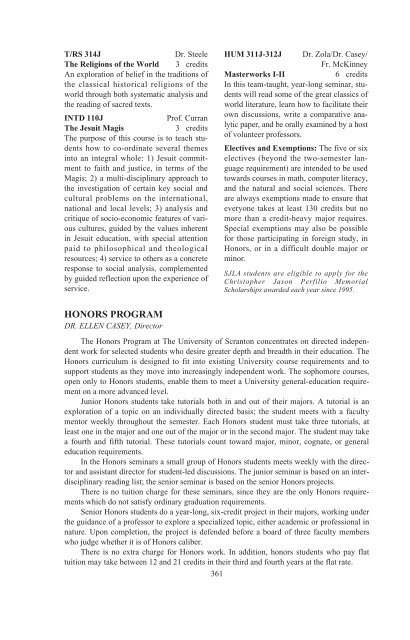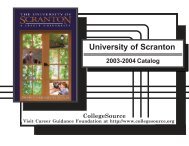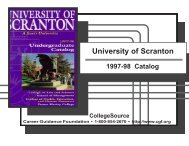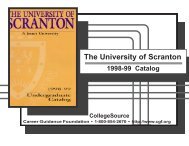2002-2003 - The University of Scranton
2002-2003 - The University of Scranton
2002-2003 - The University of Scranton
Create successful ePaper yourself
Turn your PDF publications into a flip-book with our unique Google optimized e-Paper software.
T/RS 314J Dr. Steele<br />
<strong>The</strong> Religions <strong>of</strong> the World 3 credits<br />
An exploration <strong>of</strong> belief in the traditions <strong>of</strong><br />
the classical historical religions <strong>of</strong> the<br />
world through both systematic analysis and<br />
the reading <strong>of</strong> sacred texts.<br />
INTD 110J Pr<strong>of</strong>. Curran<br />
<strong>The</strong> Jesuit Magis 3 credits<br />
<strong>The</strong> purpose <strong>of</strong> this course is to teach students<br />
how to co-ordinate several themes<br />
into an integral whole: 1) Jesuit commitment<br />
to faith and justice, in terms <strong>of</strong> the<br />
Magis; 2) a multi-disciplinary approach to<br />
the investigation <strong>of</strong> certain key social and<br />
cultural problems on the international,<br />
national and local levels; 3) analysis and<br />
critique <strong>of</strong> socio-economic features <strong>of</strong> various<br />
cultures, guided by the values inherent<br />
in Jesuit education, with special attention<br />
paid to philosophical and theological<br />
resources; 4) service to others as a concrete<br />
response to social analysis, complemented<br />
by guided reflection upon the experience <strong>of</strong><br />
service.<br />
HONORS PROGRAM<br />
DR. ELLEN CASEY, Director<br />
HUM 311J-312J Dr. Zola/Dr. Casey/<br />
Fr. McKinney<br />
Masterworks I-II 6 credits<br />
In this team-taught, year-long seminar, students<br />
will read some <strong>of</strong> the great classics <strong>of</strong><br />
world literature, learn how to facilitate their<br />
own discussions, write a comparative analytic<br />
paper, and be orally examined by a host<br />
<strong>of</strong> volunteer pr<strong>of</strong>essors.<br />
Electives and Exemptions: <strong>The</strong> five or six<br />
electives (beyond the two-semester language<br />
requirement) are intended to be used<br />
towards courses in math, computer literacy,<br />
and the natural and social sciences. <strong>The</strong>re<br />
are always exemptions made to ensure that<br />
everyone takes at least 130 credits but no<br />
more than a credit-heavy major requires.<br />
Special exemptions may also be possible<br />
for those participating in foreign study, in<br />
Honors, or in a difficult double major or<br />
minor.<br />
SJLA students are eligible to apply for the<br />
Christopher Jason Perfilio Memorial<br />
Scholarships awarded each year since 1995.<br />
<strong>The</strong> Honors Program at <strong>The</strong> <strong>University</strong> <strong>of</strong> <strong>Scranton</strong> concentrates on directed independent<br />
work for selected students who desire greater depth and breadth in their education. <strong>The</strong><br />
Honors curriculum is designed to fit into existing <strong>University</strong> course requirements and to<br />
support students as they move into increasingly independent work. <strong>The</strong> sophomore courses,<br />
open only to Honors students, enable them to meet a <strong>University</strong> general-education requirement<br />
on a more advanced level.<br />
Junior Honors students take tutorials both in and out <strong>of</strong> their majors. A tutorial is an<br />
exploration <strong>of</strong> a topic on an individually directed basis; the student meets with a faculty<br />
mentor weekly throughout the semester. Each Honors student must take three tutorials, at<br />
least one in the major and one out <strong>of</strong> the major or in the second major. <strong>The</strong> student may take<br />
a fourth and fifth tutorial. <strong>The</strong>se tutorials count toward major, minor, cognate, or general<br />
education requirements.<br />
In the Honors seminars a small group <strong>of</strong> Honors students meets weekly with the director<br />
and assistant director for student-led discussions. <strong>The</strong> junior seminar is based on an interdisciplinary<br />
reading list; the senior seminar is based on the senior Honors projects.<br />
<strong>The</strong>re is no tuition charge for these seminars, since they are the only Honors requirements<br />
which do not satisfy ordinary graduation requirements.<br />
Senior Honors students do a year-long, six-credit project in their majors, working under<br />
the guidance <strong>of</strong> a pr<strong>of</strong>essor to explore a specialized topic, either academic or pr<strong>of</strong>essional in<br />
nature. Upon completion, the project is defended before a board <strong>of</strong> three faculty members<br />
who judge whether it is <strong>of</strong> Honors caliber.<br />
<strong>The</strong>re is no extra charge for Honors work. In addition, honors students who pay flat<br />
tuition may take between 12 and 21 credits in their third and fourth years at the flat rate.<br />
361
















